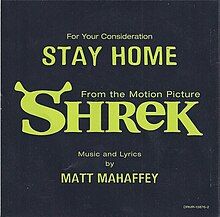Stay Home
| "Stay Home" | ||||
|---|---|---|---|---|
 | ||||
| Single by Self | ||||
| from the album Shrek: Music from the Original Motion Picture | ||||
| Released | May 15, 2001 January 12, 2002 (single) | |||
| Recorded | 2000–2001 | |||
| Studio | Matt's House (Murfreesboro) | |||
| Genre | ||||
| Length | 3:32, 3:25 (single) | |||
| Songwriter(s) | Matt Mahaffey | |||
| Producer(s) | Eric Valentine[a] | |||
| Self singles chronology | ||||
| ||||
"Stay Home" is a song by American pop rock band Self, released through DreamWorks Records on May 15, 2001. It was written and performed by the band's lead member, Matt Mahaffey, with mixing and production by Eric Valentine. The track was composed for the 2001 DreamWorks animated fairy tale comedy film Shrek, appearing in its end credits.
Background
[edit]In 1999, pop rock band Self released the album Breakfast with Girls through DreamWorks Records as part of a recording contract. The band's lead member, Matt Mahaffey, continued to receive offers from the label following its release.[1] The first of these was to write a song for the opening scene of the DreamWorks Animation film Shrek.[2] Simultaneously, the studio was considering using Smash Mouth's "All Star" for the sequence, motivating Mahaffey to try topping it. He began writing and composing the song after watching a rough cut of the movie. He found Shrek to be a "curmudgeon" from it, attempting to encapsulate his vibe in the song's lyrics and finishing it a month later as "Stay Home".[3]
Marylata Elton, the supervisor for Shrek's music, found the song to work perfectly. She tested the song in early movie screenings but discovered that audiences preferred "All Star" due to its pre-existing cultural impact. DreamWorks' founder Jeffrey Katzenberg opted to license the latter,[4] moving Self's song to the film's credits. Though initially disappointed, Mahaffey retrospectively supported the decision, describing it as "sonically gorgeous" and stating that Smash Mouth deserved the success in an interview with Syfy.[3]
Release
[edit]"Stay Home" was released on May 15, 2001, as the first song of the soundtrack album for the film, Shrek: Music from the Original Motion Picture.[2] It was individually released as a "for your consideration" single on January 12, 2002 solely under Mahaffey's name.[5] The song additionally appeared in the Universal Studios Hollywood and Florida ride Shrek 4-D. Mahaffey continued to compose music for the Shrek franchise following "Stay Home", including contributions to Shrek in the Swamp Karaoke Dance Party (2001), Far Far Away Idol (2004),[3] Shrek 2 (2004), and Shrek Forever After (2010).[6]
Track listing
[edit]| No. | Title | Writer(s) | Length |
|---|---|---|---|
| 1. | "Stay Home" | Matt Mahaffey[b] | 3:25 |
Release history
[edit]| Country | Date | Format(s) | Edition |
|---|---|---|---|
| United States | May 15, 2001 | Soundtrack | |
| January 12, 2002 | CD | Single |
Notes
[edit]References
[edit]- ^ Paulson, Dave (October 11, 2018). "Matt Mahaffey: the Nashville music genius behind the new 'Ninja Turtles'". The Tennessean. Retrieved January 5, 2025.
- ^ a b Murray, Noel (June 7, 2001). "Self Promotion". Nashville Scene. Retrieved January 5, 2025.
- ^ a b c Weiss, Josh (May 20, 2022). "Forget Smash Mouth - these are the unsung 'all stars' of Shrek's iconic soundtrack". Syfy. Retrieved January 5, 2025.
- ^ Lindbergh, Ben (May 18, 2021). "Only Shooting Stars Break the Mold: The Massive Musical Footprint of 'Shrek'". The Ringer. Retrieved January 5, 2025.
- ^ "Matt Mahaffey – Stay Home – CD (Single, Promo), 2002". Discogs. 2002. Retrieved January 5, 2025.
- ^ Huart, Warren (August 21, 2017). "7 Ways to Go Against the Grain and Make it in the Music Industry". Produce Like A Pro. Retrieved January 5, 2025.
- ^ "Featured Song: KNOGGIN POUNDIN". Broadjam. Archived from the original on June 18, 2006. Retrieved January 5, 2025.
